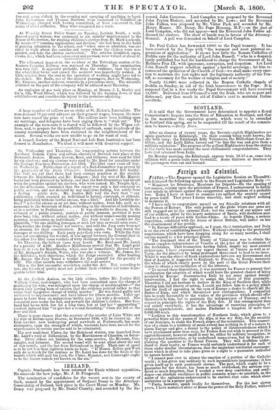Vroninrial.
A large number of colliers are on strike at St. Helen's, Lancashire. The men demand 10 per cent advance on their present wages, because the mas- ters have raised the price of coal. The colliers have been holding open air meetings, and delegates have been urging them to "stick out." The example of the turn-outs it is feared will be followed by the Wigan col- liers, and, to prepare for the possibility of outbreak, some hundreds of the county constabulary have been stationed in the neighbourhood of the mines. Several works are now unable to go on for want of coal.
A branch Society of the Royal National Life Boat Institution has been formed in Manchester. We trust it will meet with deserved support.
On Wednesday and Thursday, the long-pending actions between the Northern Reform Union and certain electors of Berwick took place at the Newcastle Assizes. Messrs. Cowen, Reed, and Gilmour, were sued for libel by six electors ; and six electors were sued by Mr. Reed for penalties under the Corrupt Practices Prevention Act 1854. The libel cases came off first, on Wednesday. Publication of a report of a Sub-Committee was proved by the proprietor of the Daily Clowniele. Defendants pleaded Not Guilty. The libel set out that there had been corrupt practices at the election between Mr. Majoribanks and Mr. Hodgson ; that the seat of Mr. Majori- banks had been procured by bribery, and that the Sub-Committee had issued writs for penalties against six electors, who were named. Mr. Temple, QC., for the defendants, contended that the report was only a fair comment on public matters, and not dictated by any malicious feeling, but solely from
a feeling public duty. Mr. justice Hill told the Jury that "any publication which exposed an individual to hatred, contempt, or ridicule, being published without lawful excuse, was a libel." And his Lordship de- fined "a lawful excuse as an act done without malice, bona fide, such as a memorial to the Secretary of State, reflecting on the character of individuals, or in a petition to Parliament It was allowable to discuss, in the columns of it public journal, matters of public interest, provided it were done bona fide, without actual malice, and without unnecessarily making personal imputations on individuals." The Jury found a verdict for the plaintiffs, "for one shilling damages, or such low sum as would carry costs." This verdict the Judge would not receive, and told the Jury costs were not an element for their consideration. Retiring again, the jury found the damages at one shilling. Each party pays their own costs. While the Jury were out considering the verdict, it was agreed between the Counsel that in the other five libel cases verdicts of forty shillings should be recorded.
On Thursday, the bribery cases were heard. Mr. Reed sued Mr. Lamb for a penalty a £100. Matthew Middlemass proved that Mr. Lamb paid him al. to vote for Majoribanks, which sum he immediately showed to one of Mr. Hodeson's friends, Waite, who was also a witness. Mr. James, for the defendant, took objections, which the Judge overruled. After hearing Mr. James, the Jury found a verdict for the plaintiff for the penalty of 1001. The other records were withdrawn till next assizes.
This is the first successful conviction under the Act. But, according to law, the friends of purity must not publish their evidence nor name delin- quents before trial.
At the Carlisle Assizes, on the 24th ultimo, before Mr. Justice Hill William Usher, coal-bagger, who had been committed upon the charge of murdering his wife, was arraigned upon the charge of manslaughter—" the Grand Jury having been of opinion that the evidence pointed rather to that crime than the graver charge of wilful murder." He was found guilty and sentenced to imprisonment and hard labour for fifteen months. L'aher ap- pears to have been an industrious thrifty man • his wife a drunkard. She concealed rum under the bed, and pawned the children's clothes. Her hus- band had borne with her for a long time but at last her "aggravating" conduct induced him "to give her a soundthrashing," when she fell on the floor and died.
There is some chance that the mystery of the murder of Luke White and his wife at Bolton-upon Dearne, in December 1856, will be cleared up. An Irish hawker, now undergoing penal servitude at Portsmouth, has made statements, upon the strength of which, warrants have been issued for the apprehension of certain parties said to be criminated.
The new mail-boat Ulster, for the Holyhead station, was launched from Mr. Laird's yard at Birkenhead, by the Marchioness of Chandoa, on Satur- day. Three others are building for the same service, the Munster, Con- naught, aud Leinster. The second vessel will be sent afloat about the end of this month, and the last from Birkenhead in April. Their rate of speed is to be not less than eighteen knots an hour. " If Messrs. Bolton and Watt enly do as much for the engines as Mr. Laird has done for the hulls of the vowels which will quit his yard, the Ulster, Munster, and Connaught ought to be the fastest vessels yet known on the sea."


























 Previous page
Previous page